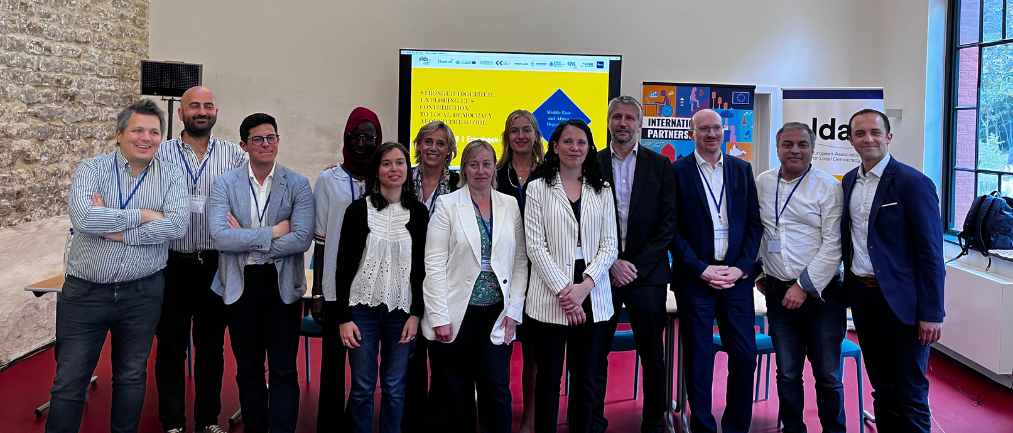The mission of this year’s ALDA General Assembly was to state that Local Democracy will save democracy. In this light, the Middle East & Africa Department organised on June 9th in Etterbeek (Brussels) a roundtable titled “Stronger together: exploring EU’s contribution to local democracy around the globe” in collaboration with the most relevant institutions, donors and partners working together with ALDA in the area.
The roundtable delved into the topic of the European Union and the French State as global agents boosting democratic values in Third Countries exploring three specific areas: the African continent, Türkiye and the Euro-Mediterranean area. The aim was to highlight the main challenges affecting local democracy in the communities bordering the EU as well as the initiatives taken by institutions and civil society organisations to address them, through concrete examples.
With the support of the Directorate-General for International Partnerships of the European Commission (DG INTPA), introduced by its Head of Sector in Democratic Governance Tom Millar, the first focus of the roundtable was given on how the EU can support local democracy in the African continent. The main priorities identified by the EU in that sense lie on youth as target beneficiaries and main actors for change, as well as country-level work. Along this line, DG INTPA is funding the WYDE – Civic Engagement project, led by EPD – European Partnership for Democracy where ALDA is managing the Cluster 1, dedicated to regranting directed to youth organisations in the whole continent. The project has been presented by the ALDA project coordinator Abdelaziz Bouslah, together with the ALDA Grants manager Faty Babou, and Cluster partners Elbarlament’s Managing director Sebastian Bloching and People in Need’s Youth Civic Engagement Advisor Kristýna Sosnovcová.
The roundtable analysed challenges affecting local democracies in the communities bordering the EU and how to adress them
In the case of Türkiye, the floor was opened by the Deputy Head of the Türkiye Unit of DG NEAR – Directorate General for Neighbourhood and Enlargement Negotiations of the European Commission Katarzyna Marzec. In her opinion, the strength of Turkish local democracy lies in the dedication of citizens and civil society organisations, who need to be supported by EU institutions in their activities. An example of engagement at the local governance level was given by Özge Sivrikaya, Senior International Affairs and Projects Expert of the Marmara Municipality Union, one of the most important Union of Municipalities of the country, behind, among many other things, the organisation of the renowned MARUF – Marmara Urban Forum. In preparation for the next local elections in 2024, the EU Delegation to Türkiye funded the WE ACT project, presented by ALDA’s Project Coordinator Apolline Bonfils, which aims to strengthen women participation by providing capacity building related to politics and media as well as subgranting to civil society organisations. As a further way to support EU-Turkish cooperation at the local level, Sinan Erensü, Chair of the Board and Hüseyincan Eryılmaz, Project coordinator of MAD – Mekanda Adalet Derneği (Centre for Spatial Justice) have presented THE:PLACE programme. This initiative, funded by the Mercator Foundation and co-managed with ALDA, seeks to reinforce the collaboration among civil society actors and local authorities on top of cross-border cooperation.
As a third but equally relevant dimension where ALDA is active, the roundtable then focused on the Euro-Mediterranean area. An overview was given by Thibaut Lespagnol, Deputy delegate for Civil society, civic engagement and youth (DGM/CIV), who highlighted the most pressing issues affecting local democracy in the area: visa restrictions, informality of the third sector, political instability among others, and gave examples on how civil society support can be provided by French cooperation actions.
In this context, the role of the Anna Lindh Foundation has been presented by its Liaison Officer in Brussels Alessandro Lamonica, who explained how two initiatives such as the award for Mediterranean Capital for Culture and Dialogue and the Med Youth in Action programme can contribute through the promotion of good practices of governance and youth empowerment.
The roundtable was closed by Sam Khebizi, President of Les Têtes de L’Art, with whom ALDA is co-leading the French Network of the Anna Lindh Foundation. He reminded that, as the title of the roundtable said, we are stronger together in supporting local democracy: as co-leaders, as donors with beneficiaries, as civil society organisations with local authorities, as Europeans with neighbours, as people believing in democracy.
